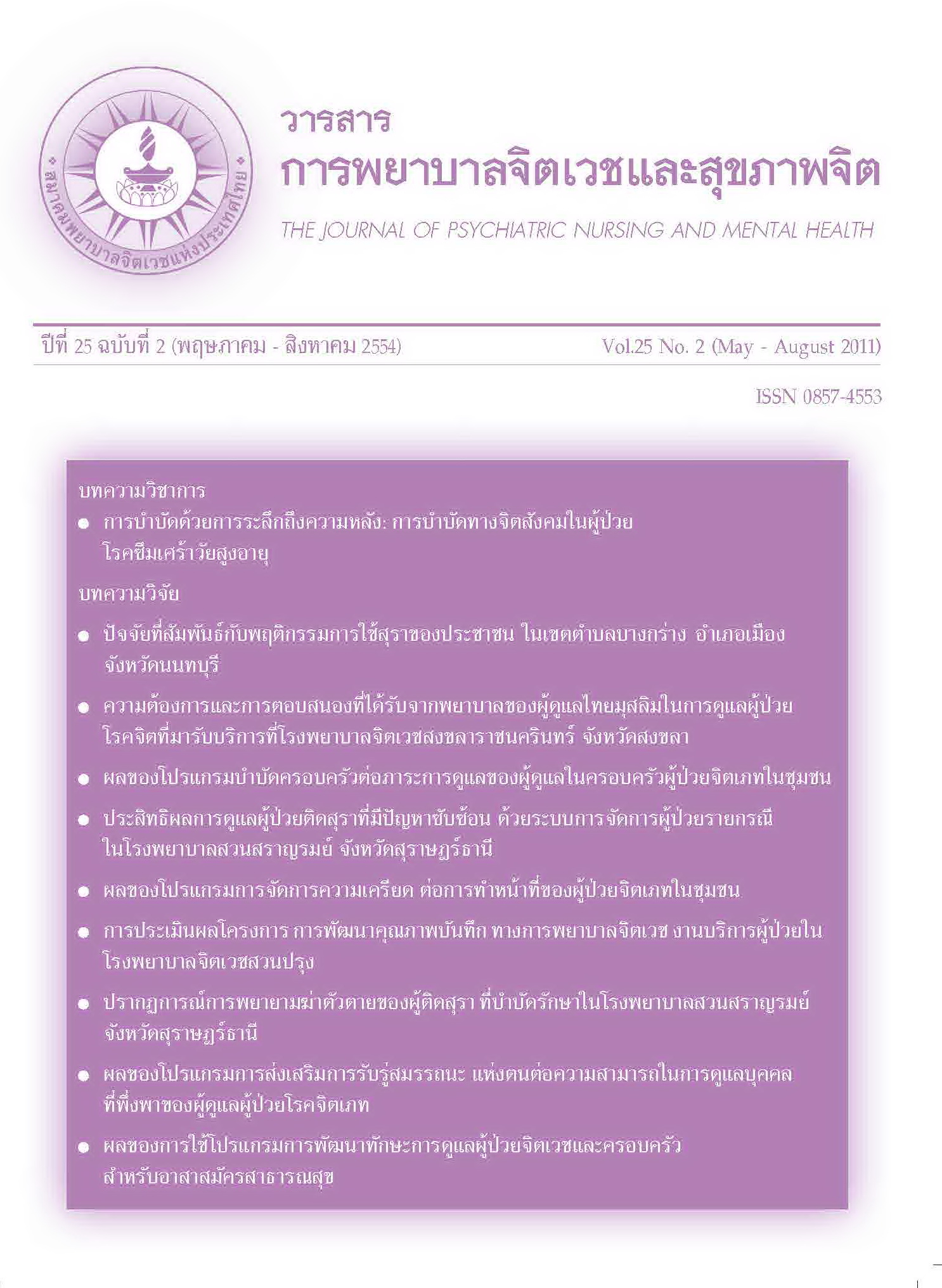ความต้องการและการตอบสนองที่ได้รับจากพยาบาลของผู้ดูแลไทยมุสลิมในการดูแล ผู้ป่วยโรคจิตที่มารับบริการที่โรงพยาบาลจิตเวชสงขลาราชนครินทร์ จังหวัดสงขลา
Main Article Content
บทคัดย่อ
บทคัดย่อ
การวิจัยเชิงพรรณนาครั้งนี้มีวัตถุประสงค์ เพื่อศึกษาความต้องการและการตอบสนองที่ได้รับจากพยาบาลของผู้ดูแลไทยมุสลิมในการดูแล ผู้ป่วยโรคจิต ที่มารับบริการโรงพยาบาลจิตเวชสงขลาราชนครินทร์ กลุ่มตัวอย่างเป็นผู้ดูแล ไทยมุสลิมในการดูแลผู้ป่วยโรคจิต ที่มารับบริการที่โรงพยาบาลจิตเวชสงขลาราชนครินทร์จำนวน 83 คน เก็บรวบรวมข้อมูลโดยใช้แบบสอบถามความต้องและการตอบสนองที่ได้รับจากพยาบาลของผู้ดูแลไทยมุสลิมในการดูแลผู้ป่วยโรคจิต พัฒนาจากความต้องการของผู้ดูแลของ บาร์โทลและคณะ (Bartol, Moon & Linto, 1994) และการดูแลผู้ป่วยให้ปฏิบัติตามหลักศาสนาอิสลามของ เชค อาลี อีซา (2539) มีค่าความเที่ยงของครอนบาค ของแบบสอบถามความต้องการของผู้ดูแล เท่ากับ 0.90 และความต้องการที่ได้รับจากพยาบาลเท่ากับ 0.94
ผลการศึกษา พบว่า กลุ่มตัวอย่างมีความต้องการของผู้ดูแลไทยมุสลิมโดยรวมอยู่ใน ระดับมาก ( = 4.32, S.D. = 0.42) เมื่อพิจารณาความต้องการรายด้านผู้ดูแล พบว่าผู้ดูแลมีความต้องการอยู่ในระดับมาก 5 ด้านโดยด้านความต้องการฝึกทักษะในการดูแลมีค่าเฉลี่ยมากที่สุด (
= 3.77, S.D.= 0.60) ส่วนความต้องการด้านการดูแลตามความเชื่อทางศาสนาและวัฒนธรรมมีค่าเฉลี่ยน้อยที่สุด (
= 3.03, S.D.= 0.75) ส่วนการตอบสนองที่ได้รับจากพยาบาลของผู้ดูแล ไทยมุสลิมโดยรวมอยู่ในระดับปานกลางค่อนข้างมาก (
= 3.56, S.D. = 0.49) เมื่อพิจารณาการตอบสนองที่ได้รับจากพยาบาลของผู้ดูแลไทยมุสลิมรายด้าน พบว่าผู้ดูแลได้รับการตอบสนองจากพยาบาลด้านการฝึกทักษะในการดูแลมีค่าเฉลี่ยมากที่สุด (
= 3.77, S.D.= 0.60) ได้รับการตอบสนองจากพยาบาลด้านการดูแลผู้ป่วยตามความเชื่อทางศาสนาและวัฒนธรรมมี ค่าเฉลี่ยน้อยที่สุด (
= 3.03, S.D.= 0.75) เมื่อเปรียบเทียบความแตกต่างระหว่างความต้องการของผู้ดูแล และการตอบสนองที่ได้รับจากพยาบาล พบว่า ความต้องการของผู้ดูแล มากกว่าความต้องการที่ได้รับจากพยาบาลอย่าง มีนัยสำคัญทางสถิติ (P < 0.01) ทั้งโดยรวมและ รายด้าน
ผลการศึกษาครั้งนี้ ใช้เป็นข้อมูลแนวทางในการพัฒนารูปแบบการดูแลผู้ป่วยเพื่อตอบสนองความต้องการของผู้ดูแลผู้ป่วยโรคจิตต่อไป
ABSTRACT
The objective of this descriptive research was to study Thai muslim caregiver’s needs and received needs from nurses in caring for psychiatric patients. Eighty-three subjects were purposively selected from Songkhla Ratchanakarindra Psychiatric Hospital. A questionnaire of caregiver’s needs and received needs from nurses was developed by integrating Bartol, Moon, and Linto (1994) s’ caregiver need framework, and Ali Esa (1982)’s Islamic principles. The content validity was verified by three experts. The reliability of the needs and received needs from nurses in caring for psychiatric patients questionnaire was tested by Cronbach’s alpha coefficient yielding values of 0.90 and 0.94 respectively. Data were analyzed using percentage, mean, standard deviation and paired t-test.
The results showed that overall needs of caregiver were at a high level ( = 4.32, S.D. = 0.42) and overall received needs from nurses was at a moderate high level (
= 3.56, S.D. = 0.49). Considering each component, caregiver’s needs in five components were at a high level. The need of participation in planning for care had the highest mean score (
= 3.77, S.D.= 0.60), caring with religious beliefs and culture had the lowest mean score (
= 3.03, S.D.= 0.75). For received needs, the overall was at a moderate high level (
= 3.56, SD = 0.49). Considering each component, the caregivers received needs from nurses in caring had the highest mean score (
= 3.77, SD = 0.60), whereas received needs in caring for patients with religious beliefs and culture had the lowest men score (
= 3.03, SD = 0.75). It was found that caregiver’ needs is significantly higher than received needs from nurses he mean score of caregiver’s needs was statistically significantly higher than that received needs from nurses (p<0.01).
The results could be used to develop a model in caring for patients that is congruent with caregiver’s needs.
Key Words : caregiver, psychiatric patients, need and received needs
Article Details
บทความที่ได้รับการตีพิมพ์แล้ว เป็นลิขสิทธิ์ของสมาคมพยาบาลจิตเวชแห่งประเทศไทย


